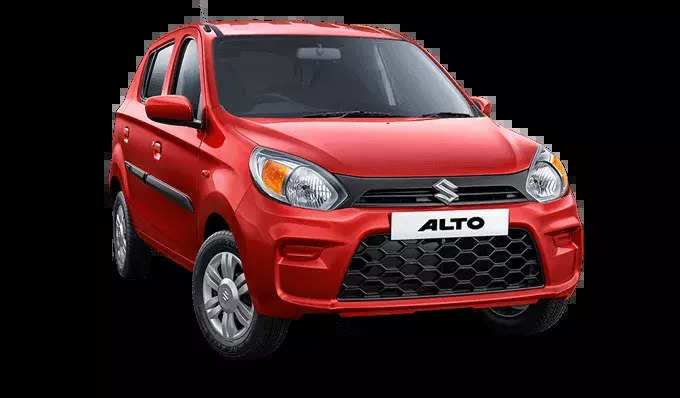
Mumbai: Entry-level cars, the bread and butter for India’s automakers until a few years ago, are fast losing their place on the wish list of the consumer.
Accounting for almost one in two cars sold in India in 2016-17, the segment’s contribution to the total passenger vehicle sales in India fell to just over one in three in the first four months of this fiscal year started April 1, according to numbers released by automakers.
The two-wheeler market too is witnessing a shift away from entry-level, non-electric offerings. Sales of 110cc motorcycles were 42% less in the April-June quarter compared with the same period four years ago, according to data from the Society of Indian Automobile Manufacturers. For 125cc scooters, the market shrank 36%.
While customer preference seems to be shifting towards sport utility vehicles, with manufacturers also launching several models in the segment including subcompact SUVs, companies such as Maruti Suzuki aren’t ready to write off small cars.
“This segment will make a comeback in fiscal 2024 and can’t be written off,” said Shashank Srivastava, senior executive director at Maruti Suzuki, the largest player in this segment and India’s passenger vehicle market. “The hatch segment has been affected by the increased cost of acquisition in recent years due to various factors like regulatory requirements, taxation and commodity price increases. The elasticity of demand is quite high with regard to prices, and this has seen a negative growth in this segment, but it remains quite high in absolute volume terms still,” said Srivastava.
According to Srivastava, the median age of the car buyer is around 24 years, and many of these youngsters are still buying the entry-level car as their first vehicle. This trend is likely to continue, and as demand for personal mobility increases with accelerating economic activity, “we can expect demand for affordable entry cars to continue,” he said.
Also, India’s cars per capita is quite low compared with other large automobile markets, offering a large room for growth, including for entry-level vehicles.
According to estimates from consultancy firm Jato Dynamics, India, with a household count of 300 million, had 22.5 million cars in 2019-20 up 1.5% from 2016; and 149 million two wheelers, a 12% increase since 2016.
These segments are yet to get saturated and there is still a lot of potential for growth, said Ravi Bhatia, president of Jato Dynamics.
Large entry-level players like Hero MotoCorp in two-wheelers and Maruti Suzuki in cars will continue to play in this segment and offer aggressive schemes, discounts and new products, according to industry experts.
Maruti Suzuki is launching a refreshed entry-level variant this month and is offering cash discounts, exchange and loyalty bonus to buyers. “Localisation, value engineering, dealer incentives and sales promotions are being done to increase sales volumes in this segment,” said Srivastava.
A Hero MotoCorp spokesperson said the entry segment held immense opportunity for growth, as two-wheeler penetration in India was far lower than several other Asian countries and also several states were lower than the national average in two-wheeler per capita.
The company has been addressing the inflation-related affordability issue by offering “innovative retail finance solutions such as Aadhaar-based loans, crop-yield based EMIs, cash bonus and low down payment”, the spokesperson added.
In fact, Honda Motorcycle & Scooter India will soon be launching a 100cc motorcycle, entering a low-end segment where it has not been present so far.
“This will stir the pot in the entry level segment,” said Vinkesh Gulati, president of the Federation of Automobile Dealers association. “The upcoming festive season will be a battleground of aggressive schemes, discounts, higher tenures and lower finance rates in the entry-level two-wheeler segment,” he added.
Despite shrinking sales, entry level 100cc motorcycles still account for 35-37% of India’s two-wheeler market of over 13.5 million units, said Atsushi Ogata, managing director at Honda Motorcycle & Scooter India. This is a big volume game, he said.
He said the company was missing out on the entry level, “which is an attractive segment and can gain from rural/semi-urban India”.
While the big players vouch for the attractiveness of the market, several manufacturers have shifted the focus to larger vehicles that offer better margins. Meanwhile, the small cars themselves have become more expensive after the introduction of new emission standards and safety rules.
“This (entry-level) is a low-margin, high-volume segment. As prices have gone up substantially, there is less enthusiasm among manufacturers to play in this segment,” said Kavan Mukhtar, head, Auto Practice, PwC.
Nissan and Renault are two fringe players in the entry-level car segment. Both companies did not reply to ET’s queries.
Bajaj Auto has been a low-key player in entry-level two-wheelers, with its CT 100 and Platina.
TVS Motor, another player in the segment, said it was offering some of the cutting-edge features even in its entry-level products.
Also, cars are cannibalising into the sales of subcompact cars, said Nikunj Sanghi, a large automotive dealer based out of Alwar in Rajasthan.
A study by Jato Dynamics shows that at the price of a new Maruti Suzuki Alto, Rs 5.31 lakh, one can buy a two-year old Honda Amaze or Hyundai Aura, or a three-year old Hyundai i20.
